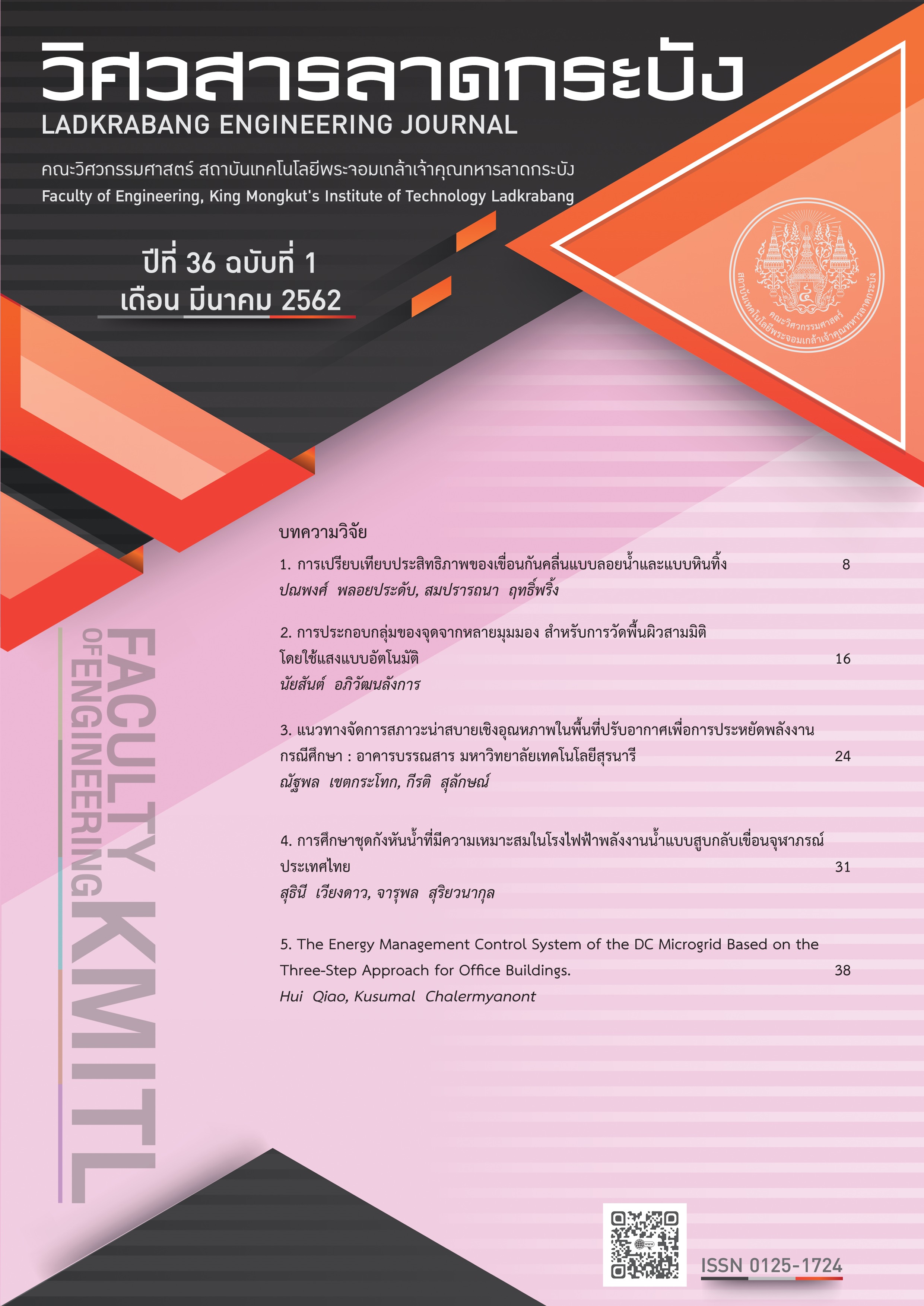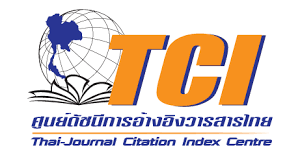The Energy Management Control System of the DC Microgrid Based on the Three-Step Approach for Office Buildings
Keywords:
dc microgrid, dc bus voltage, energy management control system (EMCS), load power point tracking (LPPT), q, real-time operation algorithm, variable dc loadAbstract
This paper proposes an energy management control system (EMCS) to manage and optimize power in dc microgrid system. The system consists of PV, AC grid and energy storage to supply the dc loads in the office building. The dc microgrid system and the EMCS module are built based on the MATLAB/Simulink platform. The suitable constraints such as the limit value of SOC of the system for the next day’s condition are obtained by considering from the day ahead predicted values of PV power and load demand. Based on those constraints, power supply priority of system sources and real-time operation algorithm, the real time control signals of PV, AC grid and the battery are performed to control and optimize the system energy and reduce supplying time of AC grid. The PV is controlled between maximum power point tracking (MPPT) and load demand power point tracking (LPPT) algorithms due to the limitations of the energy storage system.
References
L. Trigueiro dos Santos, M. Sechilariu, and F. Locment, “Optimized Load Shedding Approach for Grid-Connected DC Microgrid Systems under Realistic Constraints,” Buildings, vol. 6, no. 4, p. 50, Dec. 2016.
S. Koohi-Kamali and N. A. Rahim, “Coordinated control of smart microgrid during and after islanding operation to prevent under frequency load shedding using energy storage system,” Energy Conversion and Management, vol. 127, pp. 623–646, Nov. 2016.
X. Lu, Y. Chen, M. Fu, and H. Wang, “Multi-Objective Optimization-Based Real-Time Control Strategy for Battery/Ultracapacitor Hybrid Energy Management Systems,” IEEE Access, vol. 7, pp. 11640–11650, 2019.
García Elvira, H. Valderrama Blaví, À. Cid Pastor, and L. Martínez Salamero, “Efficiency Optimization of a Variable Bus Voltage DC Microgrid,” Energies, vol. 11, no. 11, p. 3090, Nov. 2018.
H. Sharifi and P. Maghouli, “Energy management of smart homes equipped with energy storage systems considering the PAR index based on real-time pricing,” Sustainable Cities and Society, vol. 45, pp. 579–587, Feb. 2019.
H. Mahmood, D. Michaelson, and J. Jiang, “Strategies for Independent Deployment and Autonomous Control of PV and Battery Units in Islanded Microgrids,” IEEE Journal of Emerging and Selected Topics in Power Electronics, vol. 3, no. 3, pp. 742–755, Sep. 2015.
M. Hosseinzadeh and F. R. Salmasi, “Robust Optimal Power Management System for a Hybrid AC/DC Micro-Grid,” IEEE Transactions on Sustainable Energy, vol. 6, no. 3, pp. 675–687, Jul. 2015.
N. Eghtedarpour and E. Farjah, “Control strategy for distributed integration of photovoltaic and energy storage systems in DC micro-grids,” Renewable Energy, vol. 45, pp. 96–110, Sep. 2012.
M. Gunasekaran, H. Mohamed Ismail, B. Chokkalingam, L. Mihet-Popa, and S. Padmanaban, “Energy Management Strategy for Rural Communities’ DC Micro Grid Power System Structure with Maximum Penetration of Renewable Energy Sources,” Applied Sciences, vol. 8, no. 4, p. 585, Apr. 2018.
W. S. Ho, S. Macchietto, J. S. Lim, H. Hashim, Z. A. Muis, and W. H. Liu, “Optimal scheduling of energy storage for renewable energy distributed energy generation system,” Renewable and Sustainable Energy Reviews, vol. 58, pp. 1100–1107, May 2016.
Rob J. Hyndman and George Athanasopoulos, “Forecasting: Principles and Practice,” OTexts, May. 8, 2018, Monash University, Australia. [Online]. Available: https://otexts.org/fpp2/.
S. Cheng, Y.-H. Liu, H. Hesse, M. Naumann, C. Truong, and A. Jossen, “A PSO-Optimized Fuzzy Logic Control-Based Charging Method for Individual Household Battery Storage Systems within a Community,” Energies, vol. 11, p. 469, Feb. 2018.
Downloads
Published
How to Cite
Issue
Section
License
The published articles are copyrighted by the School of Engineering, King Mongkut's Institute of Technology Ladkrabang.
The statements contained in each article in this academic journal are the personal opinions of each author and are not related to King Mongkut's Institute of Technology Ladkrabang and other faculty members in the institute.
Responsibility for all elements of each article belongs to each author; If there are any mistakes, each author is solely responsible for his own articles.






